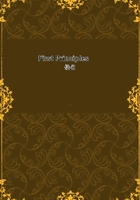
第39章
We shall always be under the necessity of contemplating it as some mode ofbeing; that is -- of representing it to ourselves in some form of thought,however vague. And we shall not err in doing this so long as we treat everynotion we thus frame as merely a symbol. Perhaps the constant formation ofsuch symbols and constant rejection of them as inadequate, may be hereafter,as it has hitherto been, a means of discipline. Perpetually to constructideas requiring the utmost stretch of our faculties, and perpetually to findthat such ideas must be abandoned as futile imaginations, may realize tous more fully than any other course, the greatness of that which we vainlystrive to grasp. By continually seeking to know and being continually thrownback with a deepened conviction of the impossibility of knowing, we may keepalive the consciousness that it is alike our highest wisdom and our highestduty to regard that through which all things exist as The Unknowable. §32. An immense majority will refuse, with more or less of indignation,a belief seeming to them so shadowy and indefinite. "You offer us,"they will say, "an unthinkable abstraction in place of a Being towardswhom we may entertain definite feelings. Though we are told that the Absoluteis the only reality, yet since we are not allowed to conceive it, it mightas well be a pure negation. Instead of a Power which we can regard as havingsome sympathy with us, you would have us contemplate a Power to which noemotion whatever can be ascribed. And so we are to be deprived of the verysubstance of our faith." This kind of protest of necessity accompaniesevery change from a lower creed to a higher. The belief in a community ofnature between himself and the object of his worship, has always been toMan a satisfactory one; and he has always accepted with reluctance thosesuccessively less concrete conceptions which have been forced upon him. Doubtless,in all times and places, it has consoled the barbarian to think of his deitiesas like himself in nature, that they might be bribed by offerings of food;and the assurance that deities could not be so propitiated must have beenrepugnant, because it deprived him of an easy method of gaining supernaturalprotection. To the Greeks it was manifestly a source of comfort that on occasionsof difficulty they could obtain, through oracles, the advice of their gods,-- nay might even get the personal aid of their gods in battle; and it wasprobably a very genuine anger which they visited upon philosophers who calledin question these gross ideas of their mythology. A religion which teachesthe Hindoo that is is impossible to purchase eternal happiness by placinghimself under the wheel of Juggernaut, can scarcely fail to seem a cruelone to him; since it deprives him of the pleasurable consciousness that hecan at will exchange miseries for joys. Nor is it less clear that to ourCatholic ancestors, the beliefs that crimes could be compounded for by thebuilding of churches, that their own punishments and those of their relativescould be abridged by the saying of masses, and that divine aid or forgivenessmight be gained through the intercession of saints, were highly solacingones; and that Protestantism, in substituting the conception of a God socomparatively unlike themselves as not to be influenced by such methods,must have appeared hard and cold. Naturally therefore, we must expect a furtherstep in the same direction to meet with a similar resistance from outragedsentiments. No mental revolution can be accomplished without more or lesslaceration. Be it a change of habit or a change of conviction, it must, ifthe habit or conviction be strong, do violence to some of the feelings; andthese must of course oppose it. For long-experienced, and therefore definite,sources of satisfaction, have to be substituted sources of satisfaction thathave not been experienced, and are therefore indefinite. That which is relativelywell known and real, has to be given up for that which is relatively unknownand ideal. And of course such an exchange cannot be made without a conflictinvolving pain. Especially, then, must there arise a strong antagonism toany alteration in so deep and vital a conception as that with which we arehere dealing. Underlying, as this conception does, all ideas conceding theestablished order of things, a modification of it threatens to reduce thesuperstructure to ruins. Or to change the metaphor -- being the root withwhich are connected our ideas of goodness, rectitude, or duty, it appearsimpossible that it should be transformed without causing these to witheraway and die. The whole higher part of the nature takes up arms against achange which seems to eradicate morality.